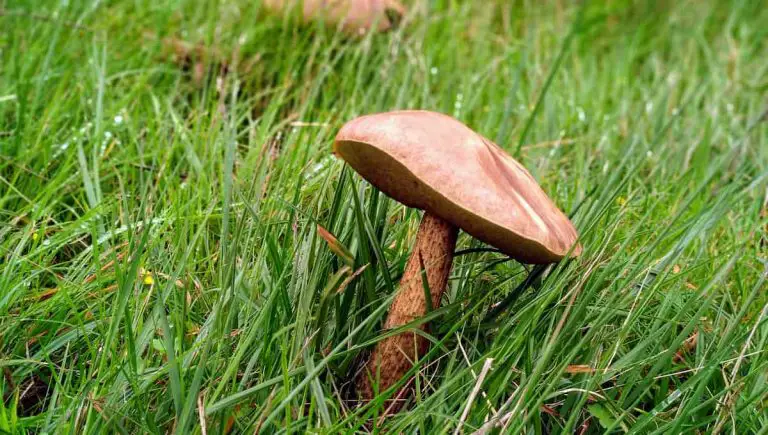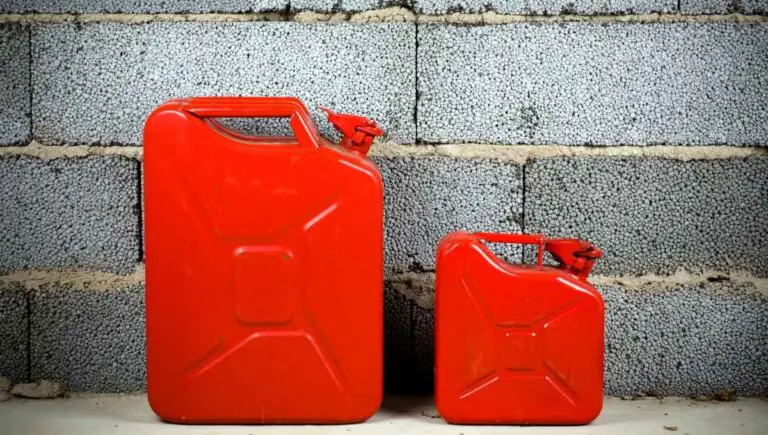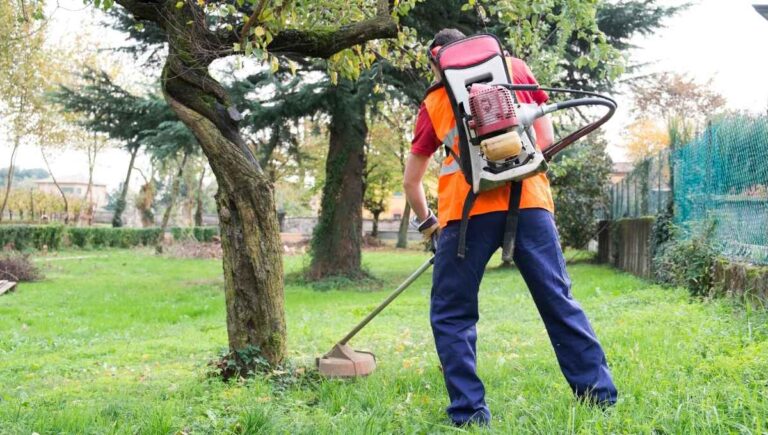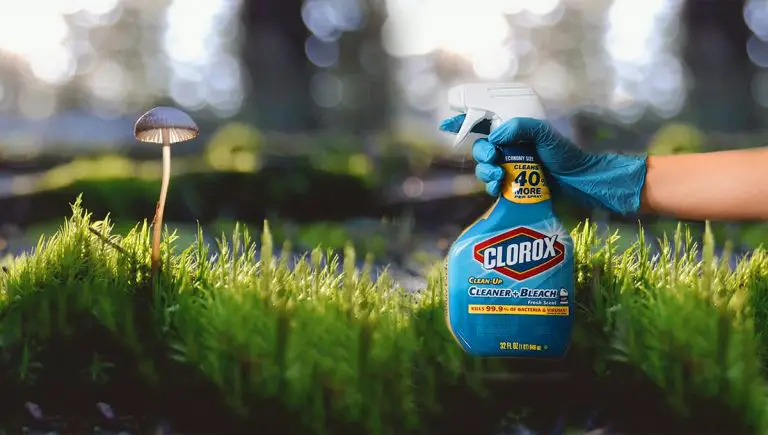Does Gasoline Kill Grass? (Do This Quick to Save Your Grass)
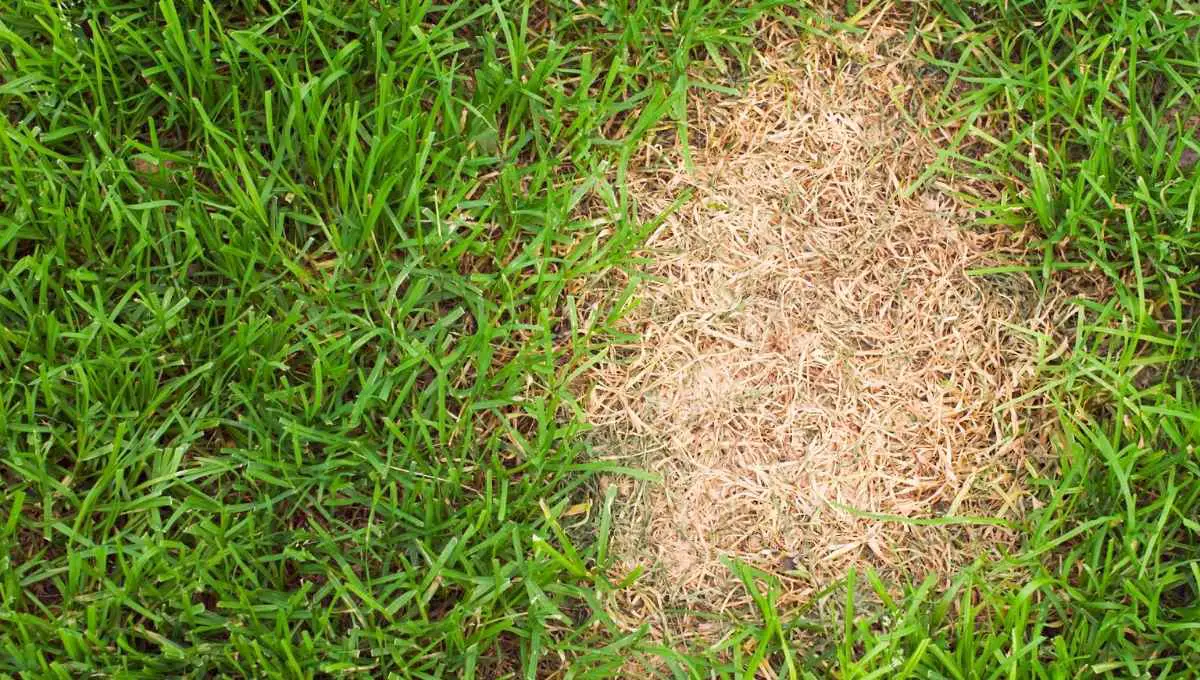
Many homeowners have experienced the frustration of accidentally spilling gasoline on their lawn, only to find that it has killed the grass. But does gasoline actually kill grass, and if so, why?
Gasoline can kill grass, bushes, trees, and all forms of vegetation and contaminate underground soil and groundwaters. Thus, purposely pouring gasoline on the ground is illegal in almost all of the United States, which is why the Environmental Protection Agency regulates its proper disposal.
Gasoline is unsafe for the vegetation around your home and can also harm you or your neighbors. You will want to keep reading to discover why this is possible.
So, let’s discuss everything about gasoline spills, how they can affect your grass and your health, and how you can safely fix them before the rest of your soil suffers damage.
This post contains affiliate links from Amazon and other stores. This means Yard Blogger may earn a commission if you make a purchase using any of our links. Please refer to our full affiliate disclosure policy for full details.
Here’s a Quick Pro Tip!
Gasoline can kill grass and weeds, but you shouldn’t use it for these purposes. It can harm you or your loved ones, so it’s best to keep your lawn gas-free. Yet, accidents can happen; luckily, many products can help you resolve them.
These astounding products will be your lawn care’s best friend, especially if you’re worried that someone may have spilled gas:
1. Tuff Builder Lawn Fertilizer – This lawn fertilizer will make your grass grow and rejuvenate again!
2. Dr. Elsey’s Cat Litter – This cat litter can help you contain the spill on future occasions!
3. Lawn Square Shovel– You can use this shovel to dig up the affected part of the soil. Later, you can refill the spot with new garden soil.
The Nightmare of Gasoline Spills
Gasoline can be highly toxic to grass and other vegetation. But, fixing the gasoline issue can be difficult if you don’t have the right tools! So, let’s learn more about how gasoline harms the grass and what ways you can fix it.
Will Spilled Gasoline Kill Grass?
Spilled gasoline will kill the grass on your lawn, absorb into the soil, and even harm your sources of water. Therefore, most lawn care experts do not recommend using gasoline to kill the unwanted grass.
Gasoline is very toxic to the environment and the people exposed to it. Thus, we recommend that you avoid using gasoline to treat weeds. Consider using a weed killer instead. And, if you spilled gasoline on the grass by accident, try to find an effective method to remove it.
What Happens if You Spill Gas on the Ground?
When gas is spilled on the ground, it will penetrate quickly into the soil and kill the existing vegetation. Once inside the soil, it will contaminate the groundwater within it and spread if not treated correctly.
Gasoline and grass don’t mix very well. Thus, it won’t take long before you notice it leaving a dead patch on the ground. Plus, it can contaminate the water within the soil. If it’s still untreated and it goes further, it could even damage any nearby well, which will become a hazard to your neighbors.
How Do You Remove Gasoline From Grass?
You can remove the gasoline from the grass by using a dissolving agent, such as kitty litter, and spread it on the affected area so that it can absorb the gas. Once the absorption is done, pick up the litter with a shop vac.
A shop vac is a tool designed to pick up wet and dry particles, so it’s used in industrial settings and workshops. Therefore, it’s the best tool after using the kitty litter or sand to absorb the gasoline and clear the affected spot.
If there was a gas spill and you could not clean it on time, you might want to take a shovel and remove the affected soil from the ground to pour a new one. The damaged soil should be put in a plastic bag and disposed of properly, according to state requirements.
Will Pouring Gas on a Tree Kill It?
Pouring high dosages of gasoline can kill trees, and all the vegetation around them, due to the toxic components it contains. Often, landscapers use it to kill the trees they need to remove to renovate a landscape, but they don’t do it carelessly.
Landscapers are thoroughly trained to use gasoline when necessary, which is why they’re sure to do it carefully. So, therefore, we can learn from this that only in certain circumstances may it be used, but in other circumstances, it’s not allowed. So, don’t try to do it independently if you’re not a trained professional.
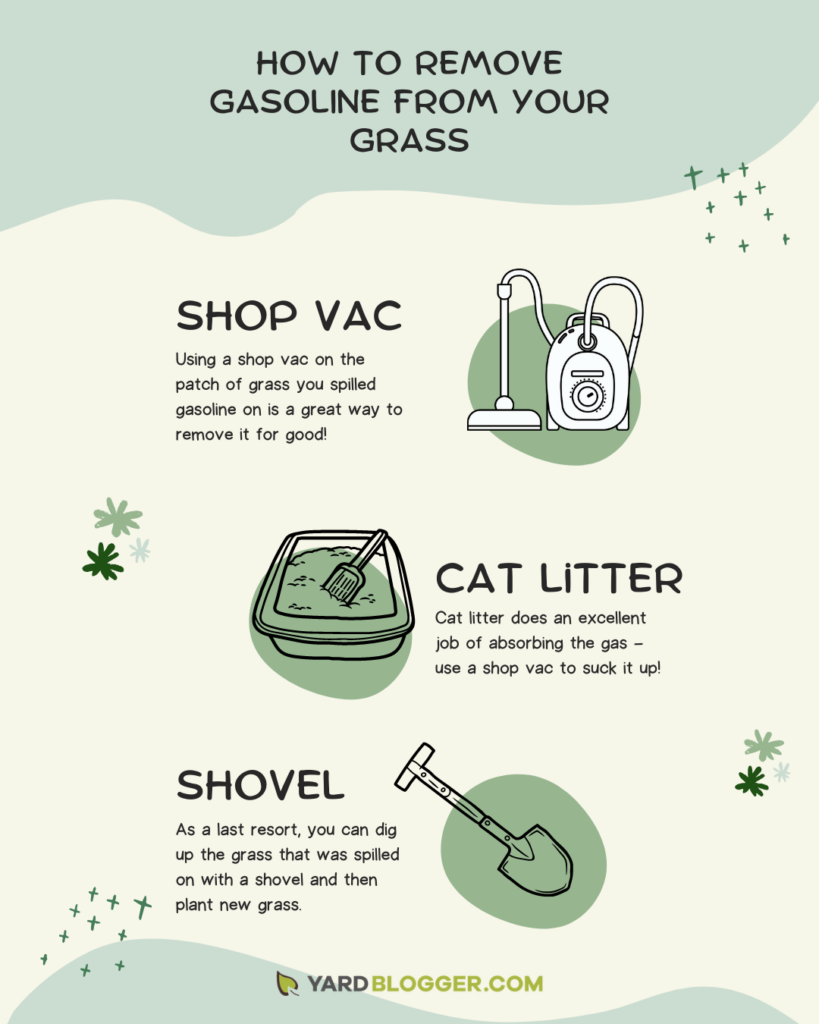
How Gasoline Affects Nature
Plants are highly sensitive to most toxins in our frequently used products, but how do they react when in touch with gasoline? And how does grass react when gasoline spills on it? Let’s talk about it below.
Can I Pour Old Gas on Weeds?
You can pour old gas on weeds to kill them, but the long-term effect of having gas in the soil may be detrimental to whatever you attempt to plant there next. So instead, consider using a weed killer or just pulling the weeds that are bothering you.
Using old gas to kill weeds is not a good idea. While the gas will still be potent enough to kill the weeds, it can cause damage to the soil and the surrounding vegetation. Not to mention, it’s illegal in many places to pour gas on the ground.
Will Spraying Gasoline on Weeds Kill Them?
You can kill weeds by spraying gasoline on them, but the quantity you use should not exceed a small amount. Using higher amounts of gasoline can be hazardous to you, your household, and your neighbors. And in some cases, it can become illegal.
Using a small amount of gasoline to spray it on invading weeds is not illegal, but you should still be careful when handling it, as its toxic components can still affect you. Moreover, pouring high amounts of gasoline on the ground is not recommended and is illegal in many states due to its highly toxic content.
How Long Does It Take Gas to Kill Grass?
Depending on how much gas was poured, it can kill the grass in an average time of 30 minutes or less. The affected grass area will begin to decrease in green color and eventually turn into a brownish-yellow shade.
Very little can be done to save the grass from then on, so all you have to do is to wait for the ground to heal on its own. You can accelerate the process by using a trusted fertilizer.
Will Gasoline Kill a Bush?
The high amount of toxic components that are found in gasoline can harm and kill bushes, trees, and all forms of vegetation growth. Therefore, it’s advised to be careful when using gasoline engines, such as lawn mowers or trimmers.
It’s common for lawn mowers to malfunction after some use, so it’s advised to get a replacement after noticing constant issues with its use. If not, you risk having it spill gasoline on your grass, trees, bushes, and anything it comes across.
Does Gasoline Affect Plant Growth?
Gasoline affects plant growth because it inhibits the reproduction process of plants and their capacity to receive carbon dioxide. Plants use carbon dioxide for photosynthesis, releasing the oxygen we need to breathe. If exposed to the gas, they cannot receive the carbon dioxide and will not grow properly.
A study conducted at the University of Lagos in Nigeria showed that throwing gasoline into the soil can reduce the growth of plants. After nine weeks of experimentation with the infamous black-eyed pea plants, they began to show signs of decay, and the soil was brutally affected.
Evaporation and Decomposition of Gasoline
Now we know that gasoline can affect your lawn and that it is highly toxic to nature. But, can gasoline evaporate? And, if it does, will it resolve the problem quicker? Let’s discuss this below.
Does Gasoline Evaporate in the Sun?
Petrol-derived products, including gasoline, can evaporate when exposed to the sun because of weak intermolecular attractions. This means that gasoline does not require much energy to release its molecular bonds.
In the science world, the lack of attraction between molecules, or atoms, is referred to as weak intermolecular bonds or forces. If atoms are not attracted to each other and repel each other, they have a weak bond and are prone to separate quicker.
Since gasoline does not have a strong molecular bond, it can evaporate quickly when exposed to high temperatures and in the open. Thus, if you are storing gasoline, keeping it away from a space where the sun directly hits is recommended.
How Long Does It Take for Gasoline to Decompose?
Gasoline takes around three to six months to decompose, and diesel takes about a year to degrade. In both cases, you should not use them if they’ve sat that long. Instead, you should dispose of them properly according to state law.
If you use expired gasoline on your machines or engines, you risk damaging them. Therefore, you should not use old gasoline to power any device. If you’re unsure how old the gasoline in your equipment is, better to drain and replace the gasoline before using the machine.
Does Gasoline Evaporate in Soil?
The gasoline on the soil’s surface can evaporate, but if it’s already sunk deep into the ground, it can’t. Since it is already underground, the sun cannot reach it. Instead, it will proceed to contaminate underground waters.
Once gasoline spills into the ground, likely, the soil has already begun to absorb it. If gasoline contaminates groundwaters, chances are that it will contaminate nearby vegetation and plants, which is not good and will result in you having a damaged lawn.
How Long Does It Take for Spilled Gasoline to Evaporate?
Spilled gasoline can take around an hour to evaporate, but certain circumstances may lead it to take longer. For gasoline to evaporate fast, it has to be exposed to air and direct sunlight. Otherwise, it won’t evaporate swiftly.
Depending on where the spilling was, the gasoline can take up to an hour or more to evaporate effectively. However, if it’s absorbed by a surface, such as soil, it will only evaporate the gas content on the surface but not what’s below it.
You might also enjoy our post on How To Get Dead Grass To Grow
How Long Does Gasoline Stay in the Soil?
Depending on the circumstances, gasoline can stay up to an hour and a half on the soil, or it can simply be absorbed and contaminate underground waters. Thus, you should make sure to know what are the proper steps to resolve the problem.
Since gasoline is highly toxic, you should not stay there and wait for the problem to leave on its own. This can be very dangerous, especially if your water source is dependent on a water well since the gasoline can contaminate it.
Does Gasoline Biodegrade?
Gasoline can biodegrade if exposed to specific conditions where the necessary microbes and fungi are present, mostly found in damp environments. But, the process does not happen quickly.
According to a toxicological profile conducted on gasoline by members of the CDC, gasoline can “biodegrade in denitrifying conditions.” Denitrification is the process in which nitrates lower and are released into the environment in the form of gas. The gas resulting from this is nitrogen. So, for gasoline to biodegrade, it must undergo this process.
How to Neutralize It!
You know about how gasoline can affect your plants. You know about certain remedies to fix it and whether gasoline decomposes or not. But how do you neutralize the spill before it gets worse? Let’s dig in!
How Do You Neutralize Gasoline?
To neutralize gasoline, you have to use an absorbent agent to neutralize the spill and allow it to absorb it. Let it sit for around 15 to 30 minutes so it can absorb properly, and then use a shop vac to collect the agent and get rid of the gas.
You can use either old flour, cat litter, or baking soda to absorb the spill. Since they will absorb the fuel, you can take it out later by using a shop vac, a good tool often used in workshops.
The shop vac can be used in damp and dry conditions, so it’s the best thing you can get yourself if you ever need to eliminate unwanted things like gas, particularly in areas that meet such conditions.
Does Vinegar Break Down Gasoline?
Vinegar can break down gasoline when spilled in clothing due to its acidic agent, and its effects can help you get rid of gasoline on your hands, cloth, fabrics, and so on. It also works on eliminating the fueling odor and getting rid of any left residue.
However, other things can break down gasoline. Lemon, hydrogen peroxide and anti-grease soap can help you get rid of gasoline if it ever spills into your hands.
Does Water Wash Away Gasoline?
Water does not have the capacity to wash away gasoline because the fuel won’t dissolve with water. So to get rid of gasoline, you’d have to use an effective solution, either through an absorbing agent or a degreasing soap.
If you attempt to wash away gasoline with water, you’ll likely spread it across the affected area. Thus, pouring water on the fuel won’t be much help, especially if it spills on grass.
Can You Put Baking Soda on Gasoline?
You can put baking soda on gasoline spots on your garage floor if you accidentally spilled it there. It will help you get rid of the stain and will help you eradicate the odor. So, it’s advisable to use it if you plan to clean fuel spots.
And, since it’s a good absorbent, it also will help you keep the rule of thumb for gasoline spills. It will contain the spill enough so you can take it out later.
You might also enjoy our post on Do Lawnmowers Take Regular Gas?
Related Questions
Is 10-Year-Old Gasoline Still Good?
Gasoline that is older than a year can cause issues to your machine if you use it, so it’s important to safely dispose of it according to state regulations implemented by the government. Gasoline does not last more than six months.
Normally, diesel lasts up to a year, and gasoline, around six months approximately. If they degrade or expire, you should call your local government to determine the best way to dispose of them without harming the environment.
Does Gasoline Eat Car Paint?
Gasoline does not eat car paint, but it does eat the car wax that protects the paint. Without the protection, car paint is bound to fall out and eventually discolor. Unfortunately, this often occurs after gasoline spills on the car paint and it’s not cleaned.
This means that the weird patch that your car probably has was probably from a moment when you were filling up the gas and didn’t see that you spilled a bit of fuel on it, which softened the wax of the paint.
What Should You Do if You Spill Gas in Your Garage?
If you spill gas in your garage, you first need to retain the spill so that it stops spreading to other areas of your garage floor. Do this by using flour, baking soda, or kitty litter to have it absorb the gas quickly.
After, just sweep the floor with a broom and discard the product you used to contain the spill. If there is a bad stain on the garage floor, use dish soap to remove it and clean the surface.
Final Thoughts
Gasoline spills are no joke: they can harm you, your neighbors, and your lawn. Therefore, you should use extra caution when using engines, such as lawn mowers, when treating your lawn or garden.
Moreover, there are many things you can do to treat your damaged lawn. For example, use either fertilizer or activated charcoal to help your lawn grow again and become greener and healthy.
Additionally, state laws have different regulations in matters of waste removal. Ensure to consult with them so that you don’t go against the law when planning to dispose of gasoline, and always take proper safety measures when dealing with gas.





